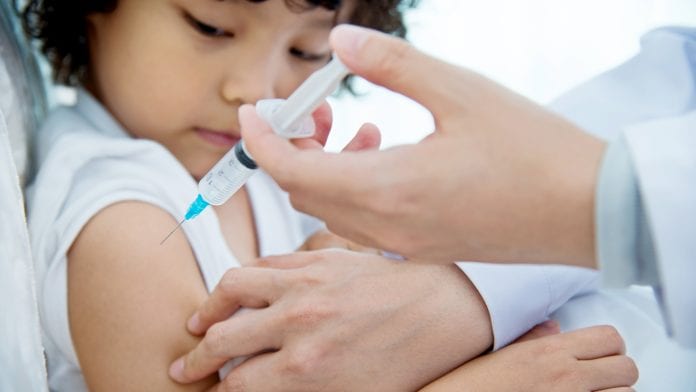
The COVID-19 pandemic has resulted in a huge global decline in the uptake of childhood vaccinations, new data has revealed.
Official data from WHO and UNICEF has revealed that 23 million children missed doses of basic vaccines through routine immunisation services in 2020. This figure is significantly higher than before the COVID-19 pandemic— increasing by 3.7 million children since 2019.
Dr Tedros Adhanom Ghebreyesus, WHO Director-General, commented: “Even as countries clamour to get their hands on COVID-19 vaccines, we have gone backwards on other vaccinations, leaving children at risk from devastating but preventable diseases like measles, polio, or meningitis.
“Multiple disease outbreaks would be catastrophic for communities and health systems already battling COVID-19, making it more urgent than ever to invest in childhood vaccination and ensure every child is reached.”
Of those children who missed a vaccination, up to 17 million did not even receive one vaccine during 2020. Most of these children live in deprived communities where access to basic health and key social services is limited.
The WHO Southeast Asian and Eastern Mediterranean regions were most affected by disruptions to immunisation services. However, all regions showed an increase in the number of children who did not receive their first vaccination during the time when access to health and immunisation services was limited. Compared to figures from 2019, 3.5 million more children missed their first dose of diphtheria, tetanus, and pertussis vaccine, while 3 million more children missed their first measles dose.
Worrying signs pre-pandemic
Henrietta Fore, UNICEF Executive Director, said: “This evidence should be a clear warning – the COVID-19 pandemic and related disruptions cost us valuable ground we cannot afford to lose – and the consequences will be paid in the lives and wellbeing of the most vulnerable.
“Even before the pandemic, there were worrying signs that we were beginning to lose ground in the fight to immunise children against preventable child illness, including with the widespread measles outbreaks two years ago. The pandemic has made a bad situation worse. With the equitable distribution of COVID-19 vaccines at the forefront of everyone’s minds, we must remember that vaccine distribution has always been inequitable, but it does not have to be.”
The data revealed that middle-income countries now account for an increasing share of unprotected children (missing at least some vaccine doses), with India experiencing a particularly large drop. A notable decrease was also seen in WHO’s Region of the Americas, where vaccination coverage is continually falling – 82% of children are fully vaccinated with DTP, down from 91% in 2016.
Global rates of childhood vaccines against diphtheria, tetanus, pertussis, measles, and polio had been stalling for several years before the pandemic. The stalled rate of 86% is well below the WHO recommended rate of 95% to protect against measles.
Disruptions to health services due to COVID-19
The WHO attributes the recent vaccine decline to the major disruptions to immunisation services during the COVID-19 response, as resources and personnel were diverted. Clinics have been closed in some countries, with many also running on reduced hours. Additionally, people have been cautious seeking healthcare due to fear of transmission or have struggled to reach healthcare services.
Dr Seth Berkley, CEO of Gavi, the Vaccine Alliance, said: “These are alarming numbers, suggesting the pandemic is unravelling years of progress in routine immunisation and exposing millions of children to deadly, preventable diseases.
“This is a wake-up call – we cannot allow a legacy of COVID-19 to be the resurgence of measles, polio and other killers. We all need to work together to help countries both defeat COVID-19, by ensuring global, equitable access to vaccines, and get routine immunisation programmes back on track. The future health and wellbeing of millions of children and their communities across the globe depends on it.”
Efforts to improve vaccine access
WHO and UNICEF are supporting countries to strengthen their immunisation systems and recover the lost ground caused by COVID-related disruptions. The organisations, alongside partners such as Gavi, the Vaccine Alliance, will be restoring services and vaccination campaigns to help countries safely deliver routine immunisation programmes. They will also be implementing country plans to prevent and respond to outbreaks of vaccine-preventable diseases, and strengthen immunisation systems.
The agencies are working with countries and partners to deliver the ambitious targets of the global Immunization Agenda 2030, which aims to achieve 90% coverage for essential childhood vaccines; halve the number of entirely unvaccinated, or ‘zero dose’ children, and increase the uptake of newer lifesaving vaccines such as rotavirus or pneumococcus in low and middle-income countries.










